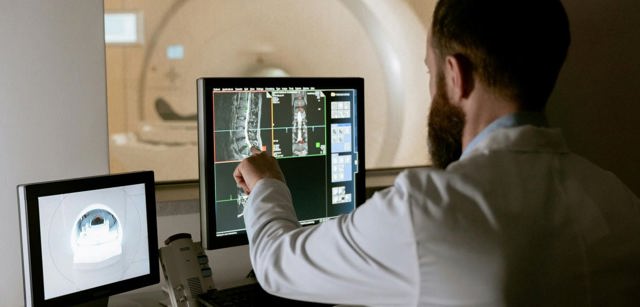< Back to news 


6 February 2025
AI Model Enhances Breast Cancer Treatment Decisions
Breast cancer is the most common form of cancer worldwide. Many patients first undergo neoadjuvant therapy (such as chemotherapy or hormone therapy) to shrink the tumor before surgery. However, not everyone responds well to this treatment, causing some patients to experience unnecessary side effects without effective results.
Researchers at the Netherlands Cancer Institute (NKI) have developed an innovative AI model, called Multi Modal Response Prediction (MRP), to address this issue. Published in Nature Communications, the study highlights how this AI model improves treatment decisions by combining multiple data sources, such as radiological images, tumor characteristics, and clinical data.
A Smarter Approach to Cancer Treatment
Unlike traditional AI models that rely on a single data type, MRP integrates multiple forms of patient information to predict whether neoadjuvant therapy will be effective. This allows doctors to:
Unlike traditional AI models that rely on a single data type, MRP integrates multiple forms of patient information to predict whether neoadjuvant therapy will be effective. This allows doctors to:
- Before treatment: Identify patients unlikely to benefit, helping to explore alternative options.
- During treatment: Monitor progress and adjust therapy as needed.
- After treatment: Assess whether surgery is necessary, potentially reducing invasive procedures. One key advantage of MRP is its ability to not only predict outcomes but also explain why it reaches its conclusions. This transparency increases trust among physicians and enables better-informed decisions.
- After treatment: Assess whether surgery is necessary, potentially reducing invasive procedures. One key advantage of MRP is its ability to not only predict outcomes but also explain why it reaches its conclusions. This transparency increases trust among physicians and enables better-informed decisions.
Towards More Personalized Cancer Care
By leveraging AI, MRP reduces physicians’ workload, accelerates treatment decisions, and improves patient outcomes. Researchers are now working to implement this model in clinical practice, making personalized breast cancer treatment a reality.
By leveraging AI, MRP reduces physicians’ workload, accelerates treatment decisions, and improves patient outcomes. Researchers are now working to implement this model in clinical practice, making personalized breast cancer treatment a reality.
Read the full article by NKI here!
Vergelijkbaar >
Similar news items

April 4, 2025
Amsterdam strengthens position as major AI hub and tech city
Amsterdam ranks among Europe’s top tech cities and is rapidly emerging as a global AI hub. The city combines strong digital infrastructure with active research networks and a vibrant startup ecosystem.
read more >

April 4, 2025
AI model aids in assessing muscle health in people with lower back pain
VU PhD candidate Eddo Wesselink developed an AI model that efficiently analyses muscle health on MRI scans—supporting improved care for people with lower back pain.
read more >
April 4, 2025
VU launches AI platform Nebula for secure access to language models
Researchers at VU can now independently work with large language models through the new platform Nebula—offering full control over data and models without relying on commercial providers.
read more >